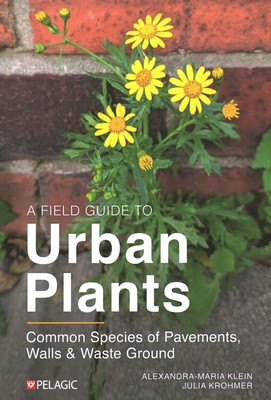
- We will send in 10–14 business days.
- Author: Alexandra-Maria Klein
- Publisher: Pelagic Publishing Ltd
- ISBN-10: 1784274747
- ISBN-13: 9781784274740
- Format: 13.6 x 19.3 x 0.9 cm, minkšti viršeliai
- Language: English
- SAVE -10% with code: EXTRA
Reviews
Description
Have you ever noticed what's growing in the city? Not in parks, front gardens and flower borders, but simply everywhere: in pavement joints, wall cracks and on roadsides. We introduce flowers, shrubs, grasses, mosses, ferns and lichens that are commonly found and show the main characteristics by which you can recognize them. Maybe you'll also be part of the #Krautschau campaign; grab a piece of chalk and alert the crack rebels in your town.
So that you can find the plants that you discover in your city in the book as quickly as possible, they are sequenced according to their growth form. It starts with the largest group, the annual and perennial herbaceous plants, followed by some woody plants, grasses, mosses, ferns and lichens. The first group is divided again according to the flower colors white, yellow, red, blue and green or brown. Within each color you will first find the flowers with a maximum of four petals, then those with five, then those with more than five and finally those with bilaterally symmetrical flowers. So that you easily know which group you are in, there are corresponding symbols in the profile at the end of each page. One look is enough and, for example, you can see the common avens: a yellow-flowering plant with five petals.EXTRA 10 % discount with code: EXTRA
The promotion ends in 23d.18:46:25
The discount code is valid when purchasing from 10 €. Discounts do not stack.
- Author: Alexandra-Maria Klein
- Publisher: Pelagic Publishing Ltd
- ISBN-10: 1784274747
- ISBN-13: 9781784274740
- Format: 13.6 x 19.3 x 0.9 cm, minkšti viršeliai
- Language: English English
Have you ever noticed what's growing in the city? Not in parks, front gardens and flower borders, but simply everywhere: in pavement joints, wall cracks and on roadsides. We introduce flowers, shrubs, grasses, mosses, ferns and lichens that are commonly found and show the main characteristics by which you can recognize them. Maybe you'll also be part of the #Krautschau campaign; grab a piece of chalk and alert the crack rebels in your town.
So that you can find the plants that you discover in your city in the book as quickly as possible, they are sequenced according to their growth form. It starts with the largest group, the annual and perennial herbaceous plants, followed by some woody plants, grasses, mosses, ferns and lichens. The first group is divided again according to the flower colors white, yellow, red, blue and green or brown. Within each color you will first find the flowers with a maximum of four petals, then those with five, then those with more than five and finally those with bilaterally symmetrical flowers. So that you easily know which group you are in, there are corresponding symbols in the profile at the end of each page. One look is enough and, for example, you can see the common avens: a yellow-flowering plant with five petals.

Reviews